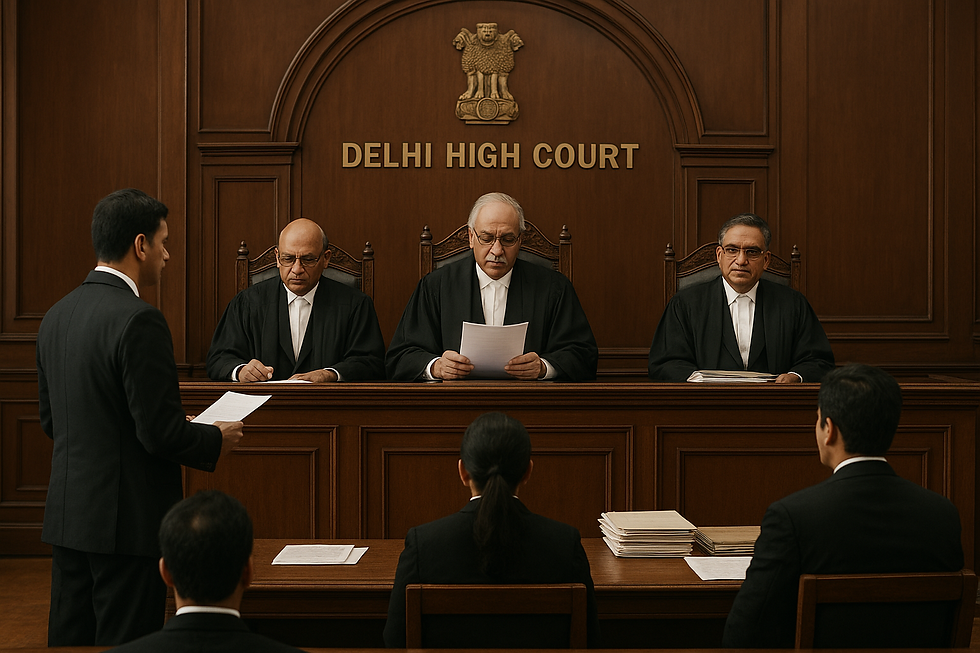Human Rights and Balancing Prison Discipline: Delhi High Court Upholding the right of Prisoner under Article 21
- Lawttorney.ai

- Oct 28, 2025
- 3 min read
Case Name: Ajmer Singh Alias Pinka V. The State of NCT, Delhi.
Introduction:
In an important judgment reinforcing Human Rights and constitutional safeguards, the Delhi High Court upheld the fundamental rights of convicts by ruling that the rejection of parole for performing the last rites of a deceased parent violates the right to dignity protected under Article 21 of the Constitution of India.
The Court stated that denying parole in the existence of humanitarian considerations would amount to a mechanical application of the prison rules, thereby undermining the essence of Human Rights and the very objectives underlying parole principles.
Justice Ravinder Dudeja emphasized that performing the last rites of a parent is not only a religious responsibility but also a deeply moral obligation — one that reflects the intrinsic value of human dignity and the right to personal liberty, both cornerstones of Human Rights protected under Article 21.

Background:
Under Article 226 of the Constitution of India, petitioner filed a Writ of Mandamus, along with Section 528 of the Bharatiya Nagarik Suraksha Sanhita (BNSS), 2023 to give him two months emergency parole. The reason for filing the petition is that his father has recently passed away, and he wants to discharge specific fulfillment of certain family responsibilities, duties, and reunite with his family and society.
The Applicant serves an imprisonment after being sentenced in a criminal case. The case was registered at Kanjhawala Police Station. He was convicted under Sections 376 (rape), 354B (assault or use of criminal force to woman with intent to disrobe), and 506 (criminal intimidation) of the Indian Penal Code, with Section 66E of the Information Technology Act. The court sentenced him to imprisonment in this case on 24th April 2025.
Although the severity of the offence, the petitioner has applied to the court requesting interim release on humanitarian grounds to do significant cultural and religious duties at his father’s death.

Delhi High Court Insight in Human Rights and Balancing Prison Discipline:
The Court finds it appropriate to grant the petitioner parole for a limited period after considering that on 16.09.2025, the petitioner’s father passed away, and on 26.09.2025, the final rites (Tehravi ceremony) are scheduled.
Accordingly, the application is allowed, and the petitioner is ordered to be released on parole for a period of four weeks from the date of release.
However, the parole is allowed on the following conditions:
The appellant must provide a personal bond of ₹20,000 with one surety of the same amount to the Jail Superintendent.
He shall live only at the address given in the case documents and shall not leave the jurisdiction of the concerned police station. Without informing the police.
Every Tuesday at 10:00 AM report to the Station House Officer (SHO), Police Station Kanjhawala, and shall be released by 11:00 AM after marking his attendance and completing the required formalities.
The applicant shall provide his number to the jail authorities and the Investigating Officer and guarantee it remains active at all times.
Also concluded, He is prohibited from attempting to influence any witnesses, tamper with evidence, or involved in any criminal activity.
After the completion of the parole period, the petitioner must surrender immediately before the Jail Superintendent.
It is directed that any breach of these conditions will manage to instant cancellation of the parole. The petition is disposed of in these terms, and a copy of the order is directed to be sent to the Jail Superintendent concerned for information and necessary compliance.
Conclusion:
The appellant on September 16, 2025, and the planned Tehravi ceremony on September 26, 2025, have been approved by the court. This parole has restrictions. He has to turn himself in right away to the jail superintendent at the end of the parole period. Parole will be immediately revoked for any unfulfilled condition. A copy of the order must be submitted to the jail superintendent for the required compliance after the petition has been resolved.
Empower Your Legal Practice with AI – Join Our Free Webinar!
Are you a legal professional looking to boost your efficiency and stay ahead in a competitive field? Discover the power of Lawttorney.AI – the cutting-edge tool designed to streamline legal research, automate tasks, and enhance productivity.
👉 Don't miss out! Reserve your spot in our FREE webinar and experience the future of legal practice today. Register Now




Comments